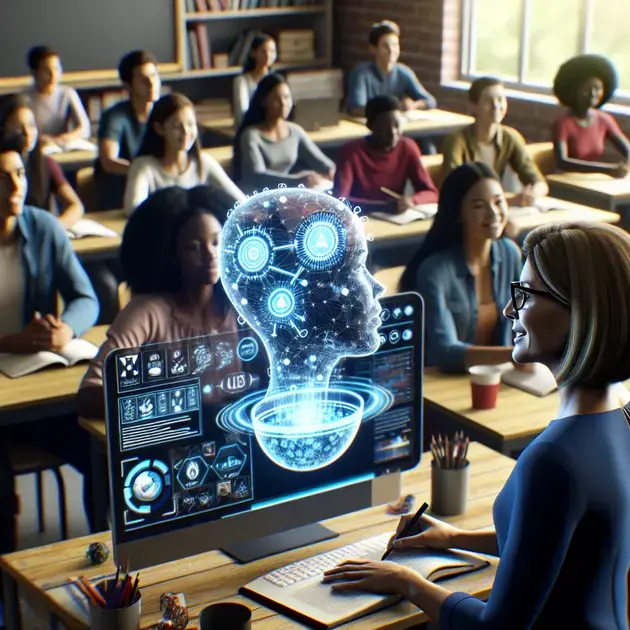Artificial intelligence (AI) has revolutionized various industries in recent years, and its impact on education is no exception. The concept of enhancing education through artificial intelligence has gained significant attention due to its potential to personalize learning experiences for students.
By utilizing AI algorithms to analyze data on student performance, preferences, and learning styles, educators can tailor their teaching methods to meet the individual needs of each student. This approach not only improves academic outcomes but also fosters a more engaging and efficient learning environment.

Enhancing Student Engagement with AI Technology
Artificial Intelligence (AI) technology has revolutionized the way students engage with learning materials. One way to enhance student engagement with AI technology is through interactive online platforms such as Coursera. Coursera offers a wide range of courses from top universities around the world, utilizing AI to personalize the learning experience for each student. By analyzing a student’s performance and preferences, AI algorithms recommend relevant courses and quizzes, keeping them engaged and motivated to learn.
Another effective way to utilize AI technology for student engagement is through chatbots. Apps like Duolingo, a language-learning platform, use AI-powered chatbots to simulate conversations, provide instant feedback, and keep students engaged in their language learning journey. These chatbots offer personalized learning experiences by adapting to the student’s pace and level of proficiency, making the learning process more interactive and enjoyable.
Moreover, AI-powered virtual reality (VR) applications like Google Expeditions enhance student engagement by bringing immersive learning experiences into the classroom. With Google Expeditions, students can explore virtual field trips to various destinations worldwide, making learning more interactive and engaging. By incorporating AI technology into virtual reality education, educators can optimize student engagement and promote a deeper understanding of complex concepts.
In addition, adaptive learning platforms like Khan Academy leverage AI algorithms to provide personalized feedback and recommendations to students based on their learning progress. By analyzing data on student performance, AI technology can identify areas where students need additional support, offering targeted resources and exercises to enhance their understanding and engagement with the material. Through AI-powered adaptive learning, students can receive tailored support and guidance, leading to improved academic outcomes.
Personalized Learning Experiences with Artificial Intelligence
Artificial Intelligence (AI) has the power to transform traditional classroom settings into personalized learning experiences for students. One way to create personalized learning experiences with AI is through the use of learning management systems like Moodle. Moodle integrates AI technology to track student progress, generate personalized learning paths, and provide real-time feedback to enhance the learning experience. By customizing courses and assignments based on individual student needs, AI-driven platforms like Moodle promote personalized learning and engagement.
Another innovative approach to personalized learning with AI is through adaptive learning apps like Sown to Grow. Sown to Grow uses AI algorithms to analyze student data, identify learning patterns, and recommend personalized goals and tasks to enhance student motivation and engagement. By providing students with insight and guidance on their learning journey, Sown to Grow creates a tailored learning experience that fosters growth and achievement.
AI-powered tutoring platforms like Smartick leverage machine learning algorithms to provide personalized math tutoring sessions for students. Smartick adapts to the student’s learning style, pace, and abilities, offering targeted exercises and feedback to promote skill development and mastery. With personalized learning plans and adaptive technology, Smartick enhances the student’s learning experience and fosters a deeper understanding of mathematical concepts.
Furthermore, AI-driven language learning applications like Babbel offer personalized learning experiences by catering to individual learning goals and preferences. Babbel utilizes AI technology to create customized lesson plans, track learning progress, and provide interactive exercises that adapt to the student’s proficiency level. By offering personalized feedback and real-world contexts, Babbel enhances language learning experiences and promotes student engagement and retention.
Optimizing Education with AI Analytics
Artificial Intelligence (AI) analytics play a crucial role in optimizing education by providing insights into student performance, behavior, and learning outcomes. One way to optimize education with AI analytics is through learning analytics platforms like Brightspace. Brightspace uses AI algorithms to analyze student data, identify learning trends, and personalize learning paths to enhance student engagement and success. By leveraging AI analytics, educators can make data-informed decisions to improve teaching practices and student outcomes.
Another effective use of AI analytics in education is through predictive analytics tools like Civitas Learning. Civitas Learning leverages AI technology to predict student outcomes, identify at-risk students, and recommend interventions to improve retention and academic success. By analyzing student data and behavior, AI analytics can optimize the student experience, leading to higher student engagement and achievement.
AI-powered assessment tools like Gradescope help educators optimize education by streamlining grading processes, providing instant feedback, and generating valuable insights into student performance. By using AI analytics to automate grading and provide personalized feedback, Gradescope enhances the efficiency of assessment practices and promotes student engagement and learning improvement.
Furthermore, AI analytics platforms like BrightBytes analyze school-wide data to identify areas for improvement, optimize resource allocation, and measure the impact of educational interventions. By leveraging AI analytics, school administrators can make informed decisions to enhance student outcomes, promote equity, and drive continuous improvement in education.

Revolutionizing Classroom Instruction through AI Integration
Artificial Intelligence (AI) is revolutionizing the way classroom instruction is delivered, providing educators with powerful tools to enhance the learning experience for students. By integrating AI technology into the educational setting, teachers can personalize lesson plans, track student progress more accurately, and identify areas where individual students may need additional support. This level of personalized instruction can significantly improve student engagement and comprehension, leading to better academic outcomes.
One of the key benefits of AI integration in the classroom is the ability to analyze large amounts of data quickly and efficiently. This allows educators to identify trends and patterns in student performance, helping them tailor their teaching strategies to meet the specific needs of each student. By leveraging AI tools, educators can create a more dynamic and adaptive learning environment that is responsive to the unique learning styles of individual students.
Furthermore, AI technology can assist educators in developing more interactive and engaging lesson plans. Virtual reality simulations, personalized learning modules, and AI-powered tutoring systems are just a few examples of how AI can be used to create immersive learning experiences. By incorporating these innovative tools into their teaching practices, educators can capture the interest and attention of their students in new and exciting ways.
Overall, the integration of AI into classroom instruction represents a significant shift in the way education is delivered. By empowering educators with advanced AI tools and resources, schools can better prepare students for success in the 21st century and beyond.
Empowering Educators with AI Tools
Empowering educators with AI tools can significantly enhance their ability to deliver high-quality instruction and support student learning outcomes. By providing teachers with access to AI-powered analytics tools, schools can help educators make more informed decisions about curriculum planning, classroom management, and student interventions. These tools can analyze student data in real-time, identify areas for improvement, and suggest personalized strategies to support student success.
Additionally, AI tools can streamline administrative tasks for educators, allowing them to focus more of their time and energy on teaching. Automated grading systems, virtual lesson planning assistants, and AI-powered communication tools can help educators manage their workload more efficiently, freeing up time for personalized instruction and student support.
Furthermore, AI tools can facilitate collaboration among educators, enabling them to share resources, strategies, and best practices more effectively. By fostering a culture of collaboration and knowledge sharing, AI can help educators continuously improve their teaching practices and enhance the overall quality of education in schools.
Ultimately, empowering educators with AI tools is crucial for ensuring that they have the support and resources they need to help all students succeed. By leveraging the power of AI technology, schools can create a more dynamic and engaging learning environment that meets the diverse needs of today’s learners.
Implementing AI Strategies for Educational Progress
Implementing AI strategies for educational progress involves carefully planning and integrating AI technologies into the existing educational framework to maximize their potential impact. Schools must first assess their current infrastructure and capabilities to determine how AI can best support their educational goals. This may involve investing in AI software, training educators on how to use AI tools effectively, and establishing clear objectives for integrating AI into the classroom.
Once a solid foundation is in place, schools can begin implementing AI strategies in various aspects of the educational process, such as personalized learning, student assessment, and classroom management. By incorporating AI tools into these areas, educators can create a more tailored and responsive learning experience for students, leading to improved academic outcomes.
It is essential for schools to continuously monitor and evaluate the impact of AI strategies on educational progress. By collecting data on student performance, educator effectiveness, and overall learning outcomes, schools can identify areas of success and areas needing improvement. This data-driven approach can help schools refine their AI strategies over time and ensure that they are achieving their desired educational goals.
Overall, implementing AI strategies for educational progress requires a commitment to innovation, collaboration, and continuous improvement. By harnessing the power of AI technology, schools can create a more adaptive and personalized learning environment that prepares students for success in an increasingly complex and interconnected world.
Conclusion
In conclusion, the integration of Artificial Intelligence (AI) into classroom instruction is revolutionizing the education sector by providing educators with powerful tools to enhance the learning experience for students. By incorporating AI technology, teachers can personalize lesson plans, track student progress more accurately, and identify areas where additional support is needed, ultimately improving student engagement and comprehension.
Moreover, the ability of AI to analyze large amounts of data quickly enables educators to tailor their teaching strategies to meet the specific needs of each student. By creating a dynamic and adaptive learning environment responsive to individual learning styles, educators can foster a more effective learning experience. Utilizing AI tools such as virtual reality simulations, personalized learning modules, and AI-powered tutoring systems further enhances the engagement and interest of students.
Empowering educators with AI tools not only enhances their ability to deliver high-quality instruction and support student learning outcomes but also streamlines administrative tasks, allowing educators to focus more on teaching. By fostering collaboration among educators and promoting knowledge sharing, AI facilitates continuous improvement in teaching practices, ultimately enhancing the quality of education in schools and better preparing students for the future.